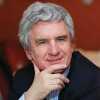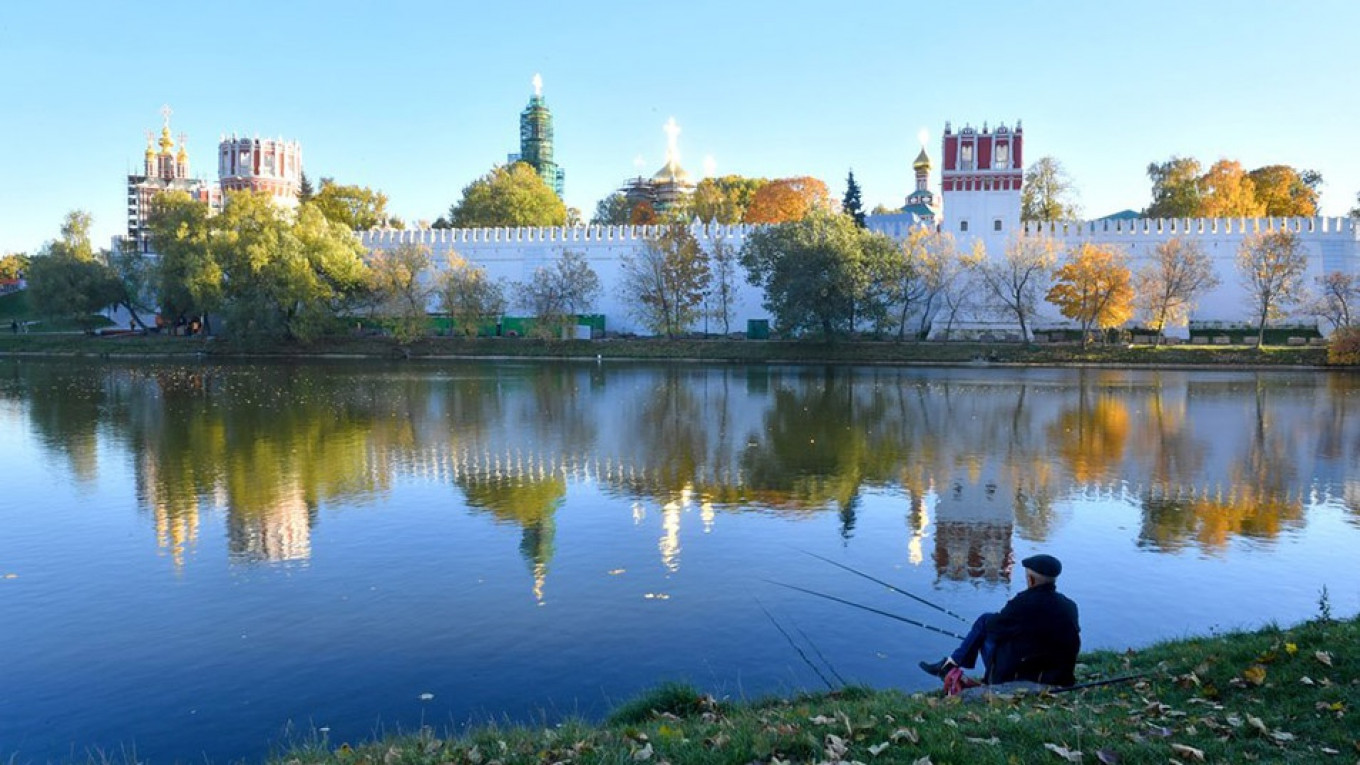If you ask me, the Novodevichy Convent is one of the most serene places in Moscow.
It is quiet, secluded and, most importantly, it seems immune to the passage of time. It is a place suitable for all seasons, come rain, snow or shine.
The grounds are free from commercial activity and in this part of Moscow there’s not much car traffic. From Novodevichy, Moscow City’s skyscrapers across the river appear smaller than they actually are. Unspoiled vistas, you come to understand, are a precious asset to a city like Moscow.
As you pass the 17th-century walls, the outside world disappears. The tombstones have weathered drastic events and historical changes, some even surviving the destructive twenties and thirties.
I sometimes look into the faces of French or Italian couples when they walk into the chapel of the Assumption Church on the convent grounds — which is unusually wide by Russian standards — and what I read in their eyes is: “This is how we imagined Russia would be.”
Adjoining these monastery walls is the most famous cemetery in Moscow. The list of names on the tombstones vary widely: From Chekhov and Gogol to Stalin’s wife and Khrushchev, in his famously black-and-white tomb, symbolizing the divergent nature of his deeds.
In spite of Novodevichy’s obvious designation as a final resting place for the famous and infamous, it does not appear sad and is not as quiet as one might expect. Many monuments stand alone as extraordinary pieces of art, making Novodevichy a major cultural attraction.
On some days, the cemetery resembles a bustling open air museum, and crowds of tourists can be a nuisance to those tending to their relatives’ graves.
Once when I was walking the grounds, a group of young Turks asked me for directions to the grave of the poet Nazim Hikmet. Some Chinese visitors go there in search of Wang Min, one of the founders of the Chinese Communist Party and an opponent of Mao, who died in exile in Moscow.
But as a symbolic resting place, Novodevichy is also distinctly Russian: The foreigners buried there can be counted on one hand.
Since 2017, an American has also been laid to rest at Novodevichy: John Kapstein, from Providence, Rhode Island.
John was 98 when he died in Milan two years ago but we, his friends, were sure that he would live beyond a hundred because of his energy and stamina.
He began talking about being buried at Novodevichy several years before his death, as if to test the thought on us. Frankly speaking, we considered it unrealistic, but it was hard to argue with someone who possessed as much authority and confidence as he did.
John left an unforgettable impression wherever he went. I’m sure even strangers can remember seeing him, always elegantly dressed, in the snowy festive streets in Megève during the winter holidays on his way to pick up a paper or seated at the Bar Tiberio, a café on the Piazzetta in Capri in the summer months.
Taxi drivers treated him with special care and waitresses were struck by his charm. John could walk into the Savoy (former Berlin) Hotel in Moscow and address the girls at reception as if he had been there the day before. Even if it had been 30 or 40 years since he was last there.
In Russian, we have a saying that a great ship needs deep waters. And that idiom says everything about John, who was a five-time recipient of the Air Medal and awarded the Distinguished Flying Cross.
At 18, he joined the Rhode Island Army National Guard before the United States entered the war and then he volunteered for pilot training. By 1943, he was a U.S. Army lieutenant flying a B-26 over the Mediterranean Sea fighting Nazi forces in North Africa. He flew combat missions in Sicily, Italy, and France. During the allied landings at Salerno in Italy, Kapstein safely ditched a badly shot-up plane at sea in the Mediterranean, saving wounded crew members.
He was rescued by the Italian Resistance and also by the British Royal Navy. In addition to a Distinguished Unit Citation, his wing also received the French Croix de Guerre with Palm for missions supporting French military action. He also was awarded the prestigious Russian Order of Friendship.
Being himself a real war hero, a man of guts and strong beliefs, nevertheless, John liked to repeat that it was the Soviet Union who broke the Nazis’ backbone. In the sixties and seventies, John’s business activities brought him into the sphere of East-West trade and cultural exchanges. It was he who organized the screening of “War and Peace” in the United States, earning it an Academy Award, and who arranged the publication of the memoirs of Marshal Zhukov, one of his heroes.
He was both opinionated and open-minded and, when talking about those years, liked to quote Dickens: “It was the best of times, it was the worst of times.”
When John passed away, his wife informed the then- Russian Ambassador in Paris, Alexander Orlov, of his wish to be buried at Novodevichy. Orlov and the Moscow mayor proceeded with minimal bureaucratic hurdles. John’s unique character had left its mark.
He didn’t have relatives in Moscow and his only claim to eastern European ancestry dated back to the 19th century. He loved doing business in New York, felt very much at ease in Paris and Megeve, and enjoyed Italy. He was a man of the world and yet remained a true American, staying on top of events at home by reading the The New Yorker. But through the years he developed a strong emotional connection to Moscow and his Russian friends. “When friends become family, that’s a blessing of God”, he used to say.
Rather symbolically right next to John’s plaque at Novodevichy is the tomb of a distinguished Russian pulmonologist Michael Perelman who saved many lives.
Both men made a difference, even if in different ways.
Dmitry Yakushkin is a former journalist and communications specialist, currently a professor at the Higher School of Economics. The views and opinions expressed in opinion pieces do not necessarily reflect the position of The Moscow Times.
A Message from The Moscow Times:
Dear readers,
We are facing unprecedented challenges. Russia's Prosecutor General's Office has designated The Moscow Times as an "undesirable" organization, criminalizing our work and putting our staff at risk of prosecution. This follows our earlier unjust labeling as a "foreign agent."
These actions are direct attempts to silence independent journalism in Russia. The authorities claim our work "discredits the decisions of the Russian leadership." We see things differently: we strive to provide accurate, unbiased reporting on Russia.
We, the journalists of The Moscow Times, refuse to be silenced. But to continue our work, we need your help.
Your support, no matter how small, makes a world of difference. If you can, please support us monthly starting from just $2. It's quick to set up, and every contribution makes a significant impact.
By supporting The Moscow Times, you're defending open, independent journalism in the face of repression. Thank you for standing with us.
Remind me later.








